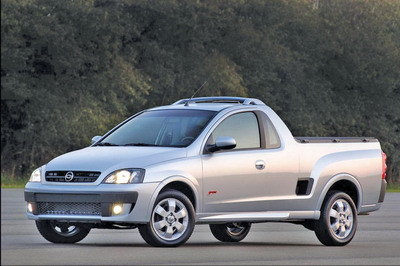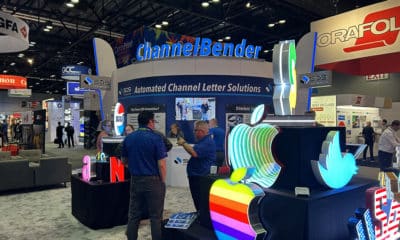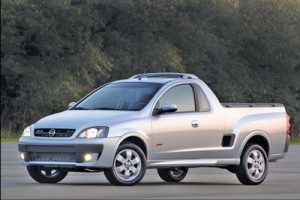Business Management
Looking for a New Vehicle?
Great deals abound, but the question is — who makes what?
Published
15 years agoon

Terry, a middle-aged guy who prefers flannel shirts and ball caps, sells used cars on a funky lot alongside Northern Kentucky’s Highway 42, a couple of miles from my house. He’s owned the business for 30 years and has a reputation for selling decent cars at a reasonable price. So, when a schoolteacher friend needed a used car, we took her to see Terry. He offered her a clean, ’03 Buick Century, with 98,000 miles, for a negotiable $5,000. The Kelly Blue Book lists this model at $5,900, so it was a clean car at a not-bad price.
The car looked and drove sweet. The schoolteacher drives less than 10 miles a day, so gasoline mileage wasn’t important – nor is she into image, so it was a decent choice. Still, she didn’t buy it.
The reason? Terry wouldn’t shut up. And, the more he talked, the more she balked. In the end, she came to believe the car was defective, that his persistent banter was masking a problem. Nonetheless, he preached on – about the car, other customers and the downturn of busi¬ness. Then, as he saw her interest fade, he stood behind his gray, metal desk and said, “I’m telling you – it’s a good car and you should buy it. What’s your problem?”
That approach doesn’t work on everyone.
Perhaps Congress could learn from this example – to listen to its constituents, rather than attempting, incessantly, to assure us, the voters, that there’s no crisis they can’t handle. The Big Three automakers bailout, for example.
AdvertisementOn November 26, 2008, a CNN story headlined “Heated Debate Over Auto Bailout,” reported Sen. Christopher Dodd (D-CT), chairman of the Senate Banking Committee, saying, “They [the Big Three] have promoted and often driven the demand of inefficient, gas-guzzling vehicles, and dismissed the threat of global warming.” Dodd also claimed their boardrooms had been devoid of vision. His comments were reported on the first two days of the Senate hearings, the one where the Detroit executives flew to Washington, DC, in private jets.
Headlines say the American auto industry is encountering high labor costs and feeble sales. It’s suffering as U.S. car shoppers endure job losses, credit difficulties and a recession.
If there’s any good news here, it’s that the situation creates a car or truck buyer’s market.
Originally, the auto builders lobbied for a $25 billion loan; a DBRS Ltd. report says they’ve already received $13.4 billion.
Toronto-based DBRS Ltd. analyzes corporate financial institution’s credit and government issues in North America, Europe, Asia and Latin America. On December 19, 2008, its website reported the U.S. government had approved a financing package to assist GM and Chrysler LLC.
Essentially, these three-year loans, as the law allows, outrank any other debt, meaning the government gets its money before anyone else does. DBRS said the loan money came from the Troubled Asset Relief Program (TARP), which was initially built for U.S. financial sector.
AdvertisementGM will receive $9.4 billion and Chrysler $4 billion; an additional $4 billion remains available, at this time.
DBRS said Ford Motor Co. isn’t receiving any part of this money, because it’s doing okay. So far.
Why not Ford? Perhaps its investment in China-based operations is paying off. Media.ford.com, a Ford Motor Co. website, on January 12, said Ford Motor China had reported sales of 306,306 units in 2008. This included 204,334 passenger cars sold via Ford Motor’s passenger-car, joint venture with China-based Changan Ford Mazda Automobile.
China’s Peoples Daily Online recently reported, in addition to Ford Motor Co.’s one billion U.S.-dollar investment in Chinese auto manufacturing, its finance group, Ford Motor Credit, has also made a $60 million investment in China. The report said Ford will invest more as its business needs grow.
On May 15, 2007, DaimlerChrysler sold itself to Cerberus Capital Management LP (NYC), a capital investment firm. Cerberus, through an affiliate, made a capital contribution of $7.4 billion in return for an 80.1% equity interest in Chrysler Holding LLC (including its related, financial-services business), which is the company’s new name. DaimlerChrysler retained 19.9% equity interest in the new company.
A May 21, 2007 report from Edmunds Auto Observer reported then Chrysler CEO Tom LaSorda said Chrysler’s ownership is now settled, and its deal with China-based auto manufacturer Chery, to build small cars in China for export to North America and Europe, will move forward. Meaning, expect to see small, China-made cars enter the U.S. soon.
AdvertisementChery is ranked first in Chinese automotive exports.
Cerberus is one of the largest, private-investment firms in the world, with approximately $23.5 billion under management in funds and accounts. Its press releases say the company currently has signifi¬cant investments in more than 50 companies that, in aggregate, generate more than $60 billion in annual revenues worldwide.
In a January 20 story titled “Chrysler: Automaker Without Borders,” Wall Street Journal writer Heide Moore said Chrysler is more receptive to foreign partnering than its American rivals.
She wrote, “Only 18 months after Chrysler was wrested from Germany’s Daimler, the U.S. automaker is selling a big stake in itself to Turin, Italy’s Fiat.” Moore said Chrysler also has a deal with Japan’s Nissan, where Chrysler will use a Mexican assembly plant to build a full-size pickup truck for Nissan. She wrote that Nissan, in turn, will use one of its Japanese plants to build a Chrysler-designed car.
A January 2, Reuters report said Chrysler LLC reported it had received an initial $4 billion emergency loan from the U.S. government. Last week, Bloomberg.com said Chrysler LLC is trading 35% of itself to Italy’s Fiat SpA, for access to small-car technology and a global sales network. Fiat already produces engines for Chrysler products.
As a further aside, Chrysler’s Ontario plant helps build Volkswagen’s Routan minivan, as well as the Dodge Grand Caravan and Chrysler Town and Country.
See all this like Peyton Place, but with cars.
On April 3, 2006, Cerebus bought 51% of General Motors Acceptance Corp. (GMAC), which is GM’s finance group. In that deal, GM was to receive approximately $14 billion in cash over three years, including distributions from GMAC, with an estimated $10 billion by closing.
In its May 21 report, Edmunds alleged: “Cerberus has no interest in making cars in North America, and no interest in employing Americans. It wants a conduit to sell 300,000 to 400,000 Chinese cars a year.”
You have to wonder if Senator Dodd knows this.
Chrysler Chief Executive Bob Nardelli, hired on August 9, 2007 by Cerberus, said the initial loan will allow the company to continue an orderly restructuring.
Nardelli, you may remember, was headlined in January, 2007, as receiving a $210 million golden parachute in cash and stock options from Home Depot, while the company’s stock value dwindled. To cut Home Depot costs, Nardelli laid off knowledgeable employees and brought in less-experienced ones, and this hurt the store’s sales
Needless to say, that action angered stockholders and drove up the price of screwdrivers.
A July 4, 2007 Associated Press report said major automakers aggressively expanded production in China, which overtook Japan last year to become the world’s No. 2 vehicle market after the U. S.
Many components in all of today’s new vehicles are manufac¬tured in China – so you can no longer say a vehicle is made in a certain country.
Here’s an interesting contrast: The Assn. of International Automobile Manufacturers says more than half of all vehicles sold by foreign automakers in the U.S. are built in the U.S. Those automakers, mostly located in the South, comprise 33% of annual national production levels (of U.S.-built cars and trucks), with a total investment of $39.3 billion.
Honda and Toyota build cars in several U.S.-located plants; BMW has a plant in South Carolina, Hyundai in Alabama and Nissan in Tennessee.
Business advisers say it’s a good time to buy a car or truck (or any other equipment) because prices are down, and I agree. But don’t base your decision on where the vehicle was made, because, frankly, it – or at least part of it – could have been made anywhere.

SPONSORED VIDEO
Introducing the Sign Industry Podcast
The Sign Industry Podcast is a platform for every sign person out there — from the old-timers who bent neon and hand-lettered boats to those venturing into new technologies — we want to get their stories out for everyone to hear. Come join us and listen to stories, learn tricks or techniques, and get insights of what’s to come. We are the world’s second oldest profession. The folks who started the world’s oldest profession needed a sign.
You may like

Michigan Residents Make Parodies of Viral Detroit City Sign

What Makes the Perfect Sign Business Partnership

Marketing Signs to Schools, Tradeshow and Quote Follow-up Make May’s List
Subscribe

Bulletins
Get the most important news and business ideas from Signs of the Times magazine's news bulletin.
Most Popular
-

 Photo Gallery2 weeks ago
Photo Gallery2 weeks ago30 Snapshots of the 2024 ISA Sign Expo
-

 Ask Signs of the Times2 weeks ago
Ask Signs of the Times2 weeks agoWhy Are Signs from Canva so Overloaded and Similar?
-

 Paula Fargo1 week ago
Paula Fargo1 week ago5 Reasons to Sell a Sign Company Plus 6 Options
-

 Real Deal5 days ago
Real Deal5 days agoA Woman Sign Company Owner Confronts a Sexist Wholesaler
-

 Photo Gallery1 week ago
Photo Gallery1 week ago21 Larry Albright Plasma Globes, Crackle Tubes and More
-

 Women in Signs2 weeks ago
Women in Signs2 weeks ago2024 Women in Signs: Brandi Pulliam Blanton
-

 Projects5 days ago
Projects5 days agoGraphics Turn an Eyesore Cooler Into a Showpiece Promo in Historic Plaza
-

 Women in Signs2 weeks ago
Women in Signs2 weeks ago2024 Women in Signs: Alicia Brothers












